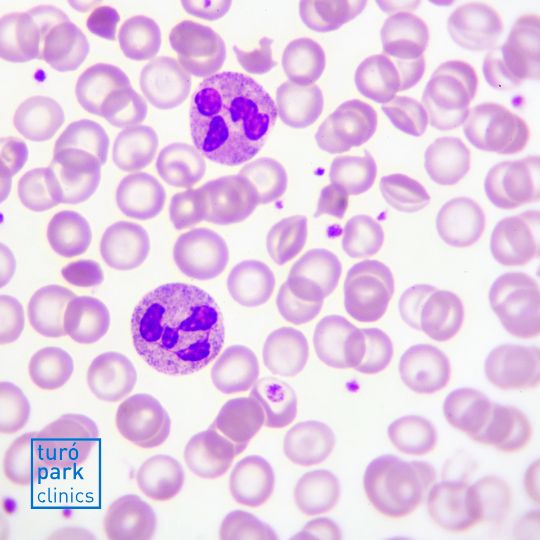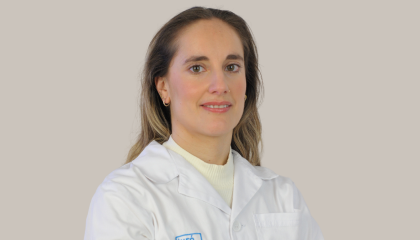Diagnosis and treatment of blood diseases
Blood is a vital tissue that ensures the proper functioning of the entire organism. It not only transports oxygen and nutrients, but also defends against infection and regulates many essential biological processes. However, when this complex system is disrupted, the consequences can manifest in various ways, ranging from persistent fatigue to abnormal bleeding or an increased risk of thrombosis.
At Turó Park Clinics, we offer you specialised hematology services in Barcelona, to diagnose and treat any alteration of the blood or the haematopoietic system.
What is hematology?
Hematology is the branch of medicine that deals with the study, diagnosis, treatment and monitoring of diseases of the blood and the organs involved in its production, such as the bone marrow, spleen and lymph nodes.
The hematologist studies the different components of the blood, such as red blood cells, white blood cells and platelets, as well as the functioning of the coagulation system. By performing specific analyses and tests, they can detect alterations that, although often asymptomatic, may still impact if not identified and treated in time.

What are the most common diseases treated by a hematologist?
The range of pathologies studied by a hematology specialist is wide. The most common ones are listed below:
Anaemias are caused by a decrease in red blood cells or haemoglobin, the protein that carries oxygen in the blood. They can be due to multiple causes, such as nutritional deficiencies (iron, vitamin B12, folic acid), blood loss or chronic diseases. Common symptoms include fatigue, pallor, dizziness, palpitations or lack of concentration.
Polyglobulia is the opposite extreme of anaemia and is due to an excessive increase of red blood cells in the blood. It may be due to secondary causes, such as living at high altitude or lung disease, or to primary haematological disorders, such as polycythaemia vera, a bone marrow disorder that causes excessive production of red blood cells. This condition, which thickens the blood, can increase the risk of thrombosis and requires medical evaluation.
Hematologists also treat abnormalities in white blood cells or leukocytes. White blood cells are cells of the immune system whose main function is to defend the body against infections, viruses, bacteria, parasites and other external threats, as well as to detect and eliminate abnormal cells (such as cancer cells). White blood cells may be elevated or decreased:
- Leukocytosis: excess white blood cells, which may indicate infections, inflammation or, in some cases, hematological diseases such as leukaemias.
- Leukopenia: a decrease in white blood cells, which may compromise the body's defences.
Platelets, or thrombocytes, are key blood cells for blood clotting, as they help stop bleeding by forming clots.
- Thrombocytopenia: a low platelet count can increase the risk of bleeding.
- Thrombocytosis: in this case the number of platelets in the blood is high, which may favour the appearance of thrombi or clots, increasing the risk of thrombosis.
Hematology also studies disorders related to deep vein thrombosis, pulmonary embolisms or unexplained thrombotic phenomena. In these cases, a thrombophilia study is performed to identify possible hereditary or acquired causes. Coagulation disorders are also investigated in women with repeated miscarriages, a situation that may have a relevant hematological component.
The proteinogram is a test that analyses the proteins in the blood. Changes in this analysis can reveal inflammatory, immunological or even haematological diseases such as multiple myeloma. Proper monitoring allows early detection and treatment of these conditions.
When is it important to see a hematologist?
Seeing a hematology specialist can make a difference in the early diagnosis of diseases that might otherwise go undetected. We recommend that you consult a hematologist if:
- You have chronic fatigue, pallor or difficulty concentrating.
- You have a personal or family history of clotting problems.
- You suffer from frequent bleeding or bruising easily and without apparent cause.
- You have had repeated miscarriages.
- Your blood tests show unexplained abnormalities (such as anaemia, leukocytosis, leukopenia or thrombocytopenia).
- You are being treated with anticoagulant drugs and need to be followed up.
Book your appointment with a hematologist in Barcelona.
Do you have symptoms, questions about your tests or family history? Our hematologists will help you understand your diagnosis and find the right treatment.
What does a hematology consultation at our clinic consist of?

Step 1: Initial assessment
During the first visit with the hematologist, a complete clinical evaluation and interpretation of blood tests and other specific tests (such as haemogram, coagulation, proteinogram, etc.) will be carried out. If you already have recent results, you can bring them to the consultation.

Step 2: Diagnosis and treatment
If a hematological disease is detected, appropriate treatment will be prescribed, which may include supplements, anticoagulants, immunosuppressants or other therapies as appropriate.

Step 3: Follow-up and monitoring
Regular follow-up is essential to monitor progress and adjust treatment if necessary. In addition, we offer care in several languages (Spanish, English, French, Dutch...) to make you feel comfortable throughout the whole process.
Why choose Turó Park Clinics?
Choosing Turó Park Clinics for your haematology consultation in Barcelona means opting for:
- An expert and committed medical team.
- Fast attention, with no waiting lists.
- A close and personalised approach.
- The possibility of coordinating your treatment with other specialists if necessary.
